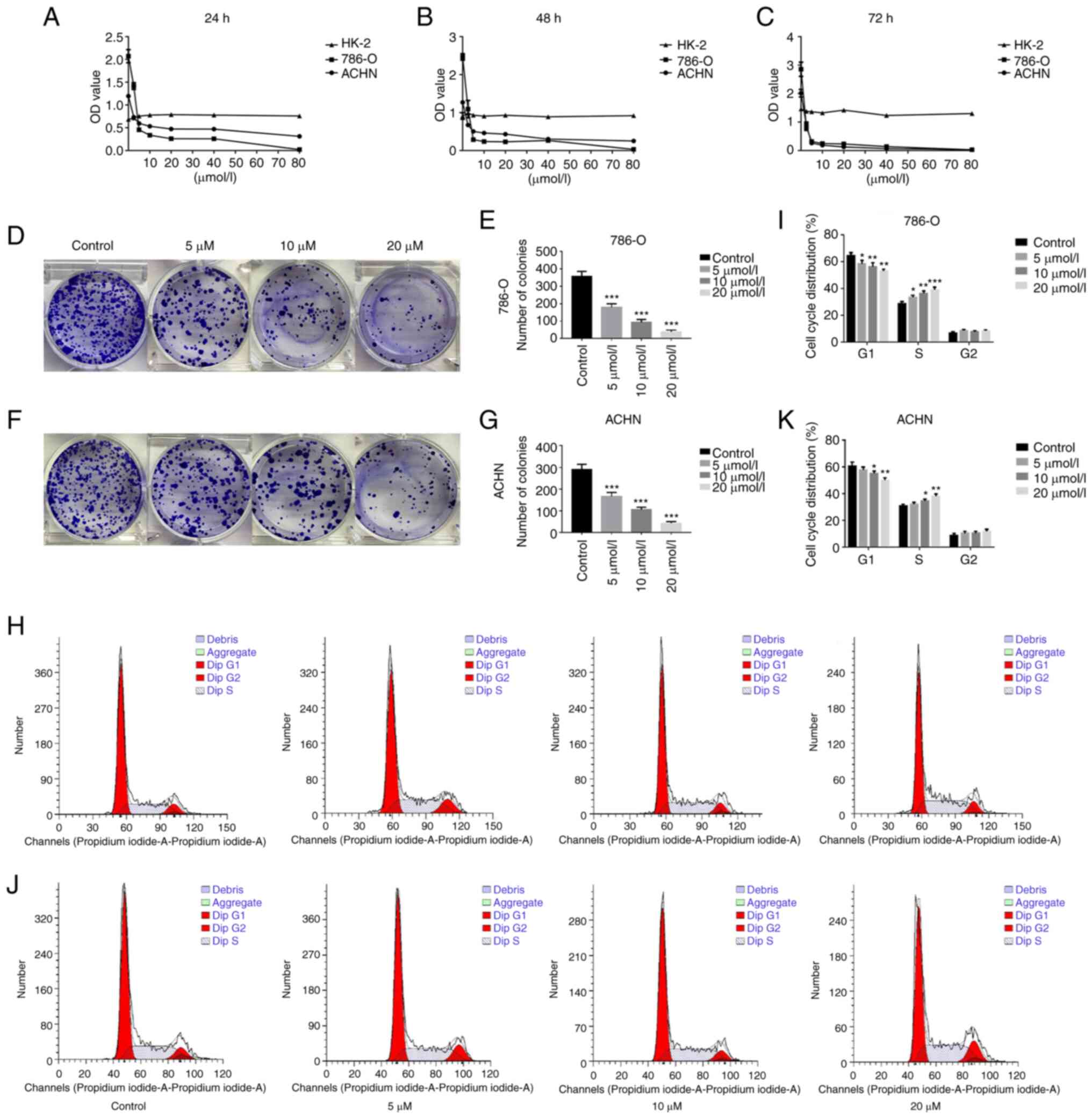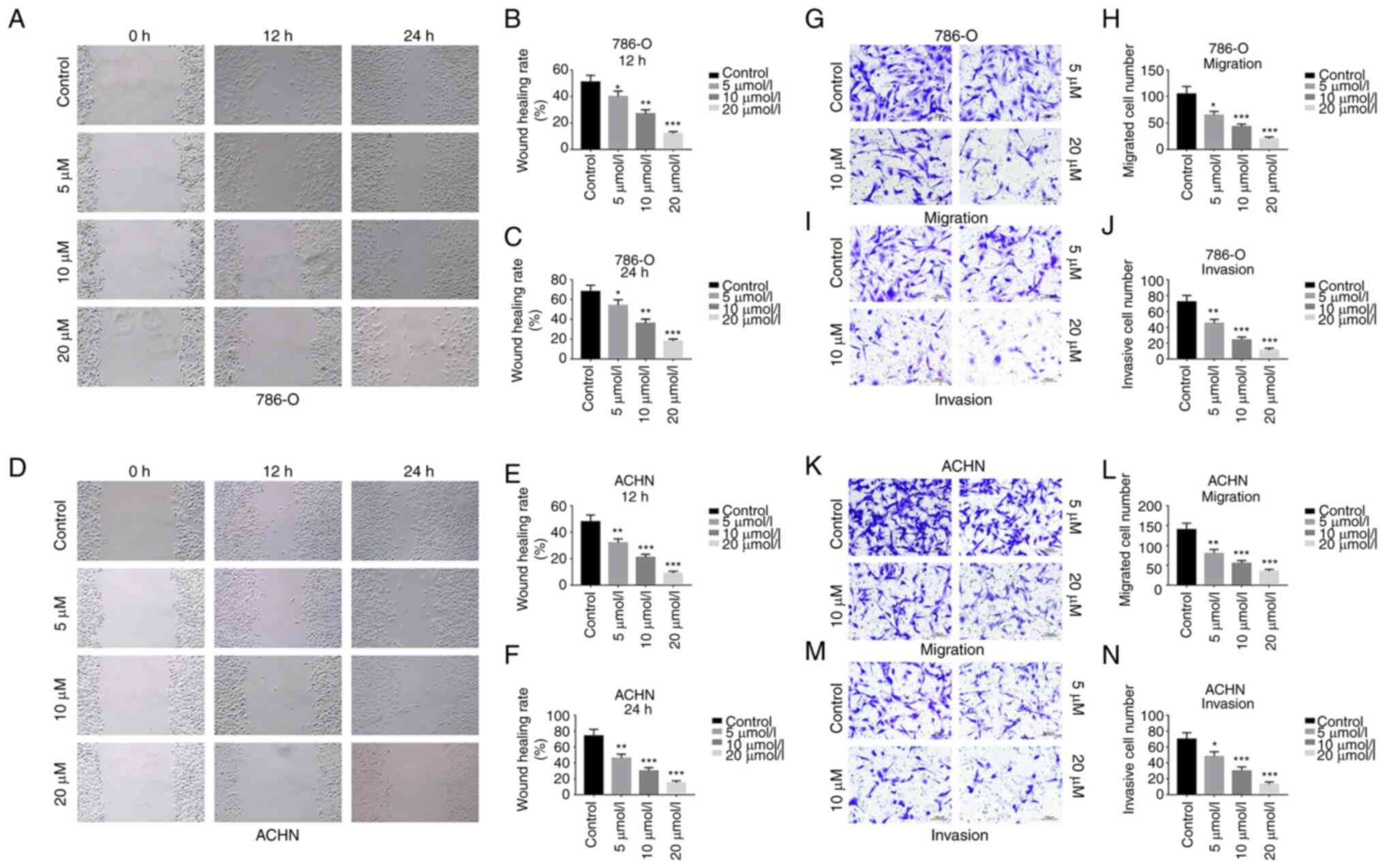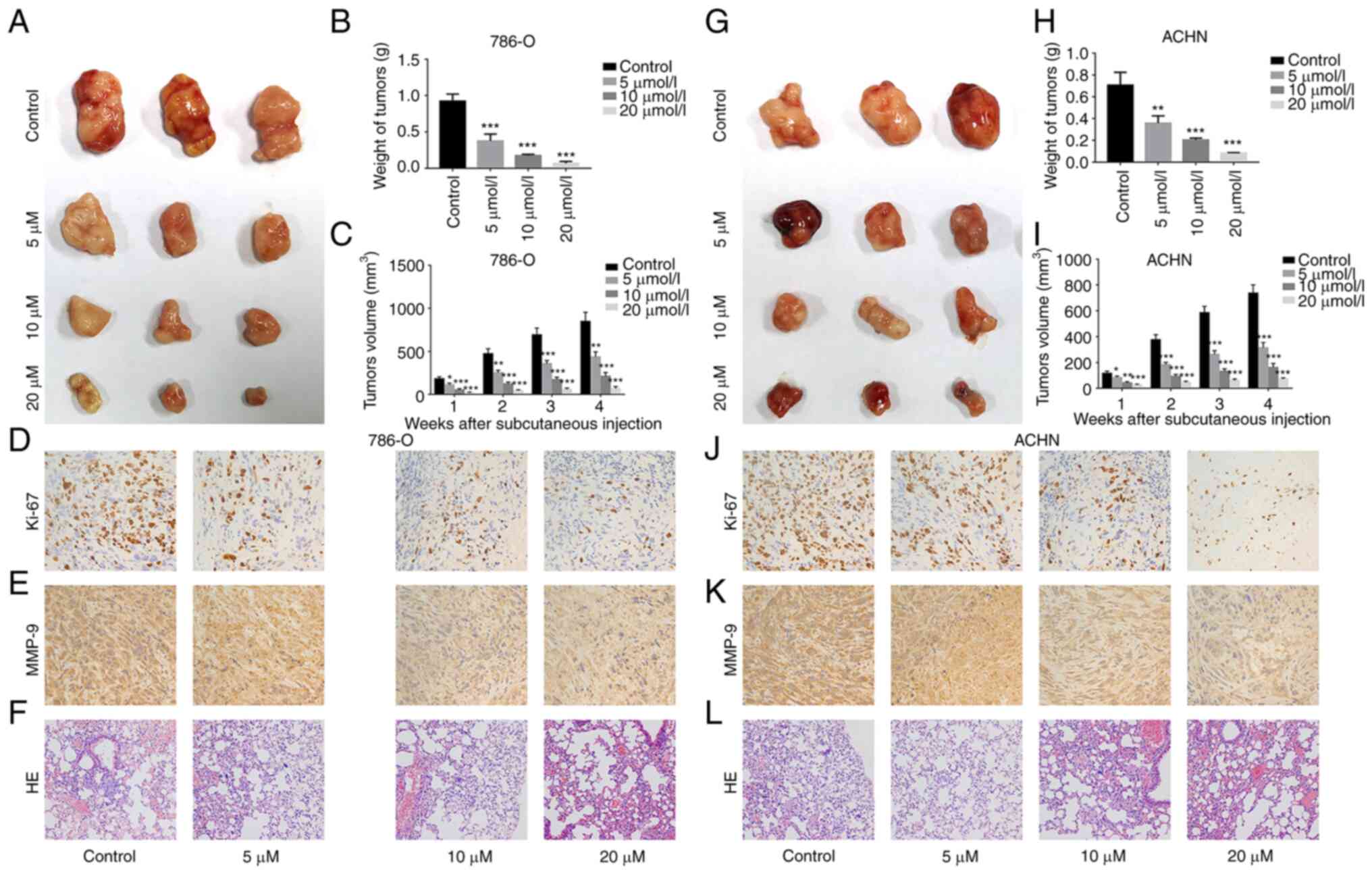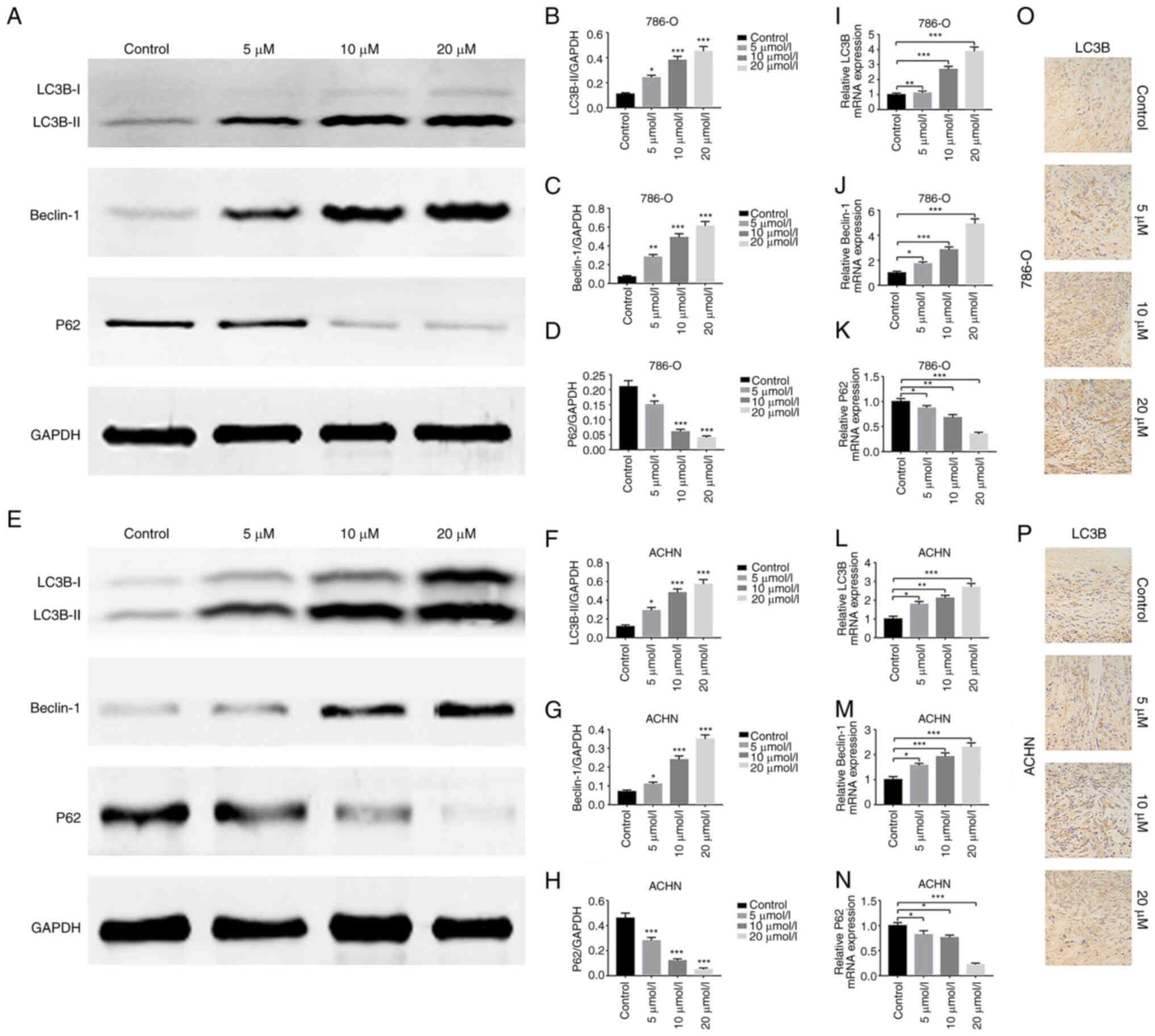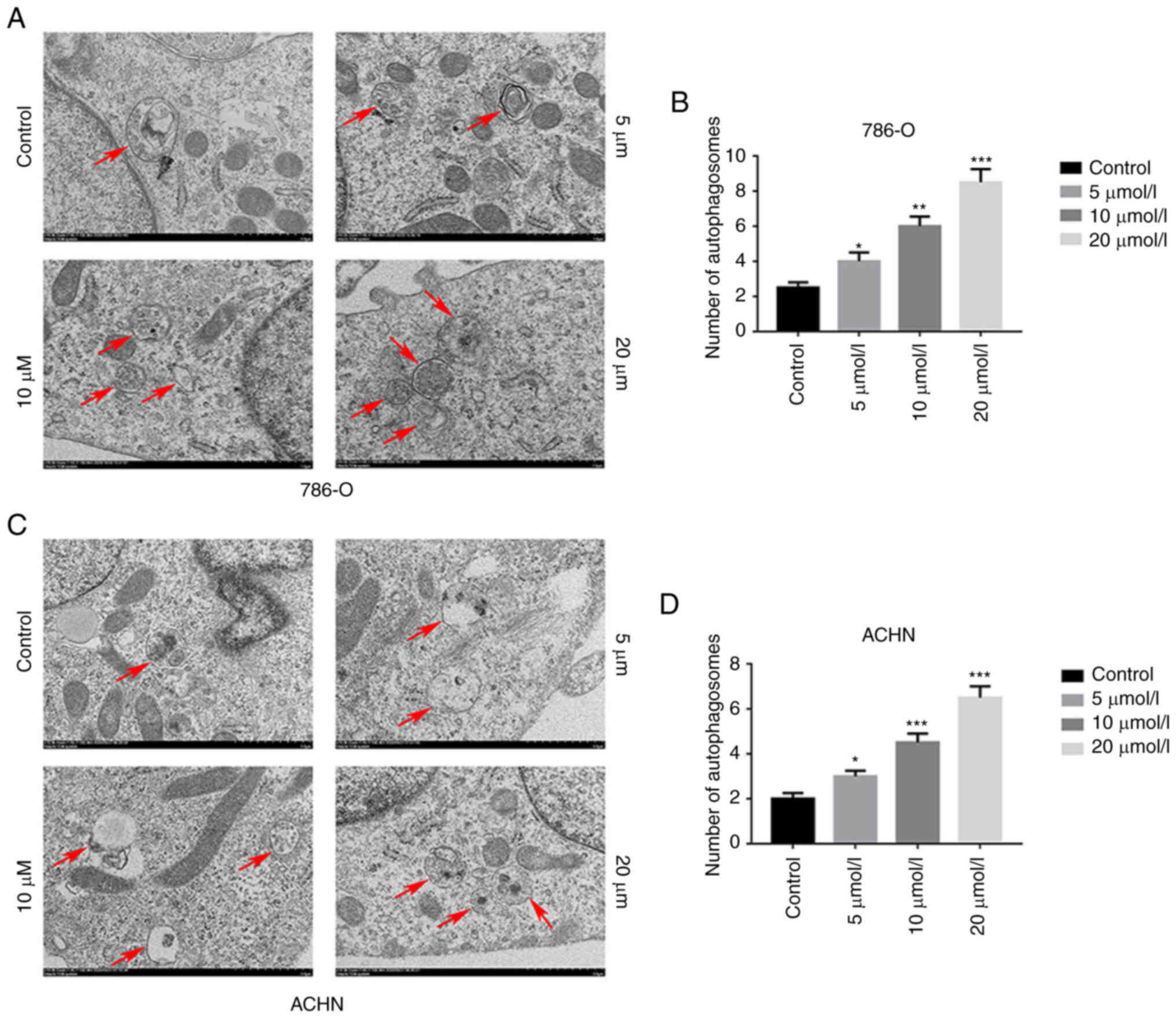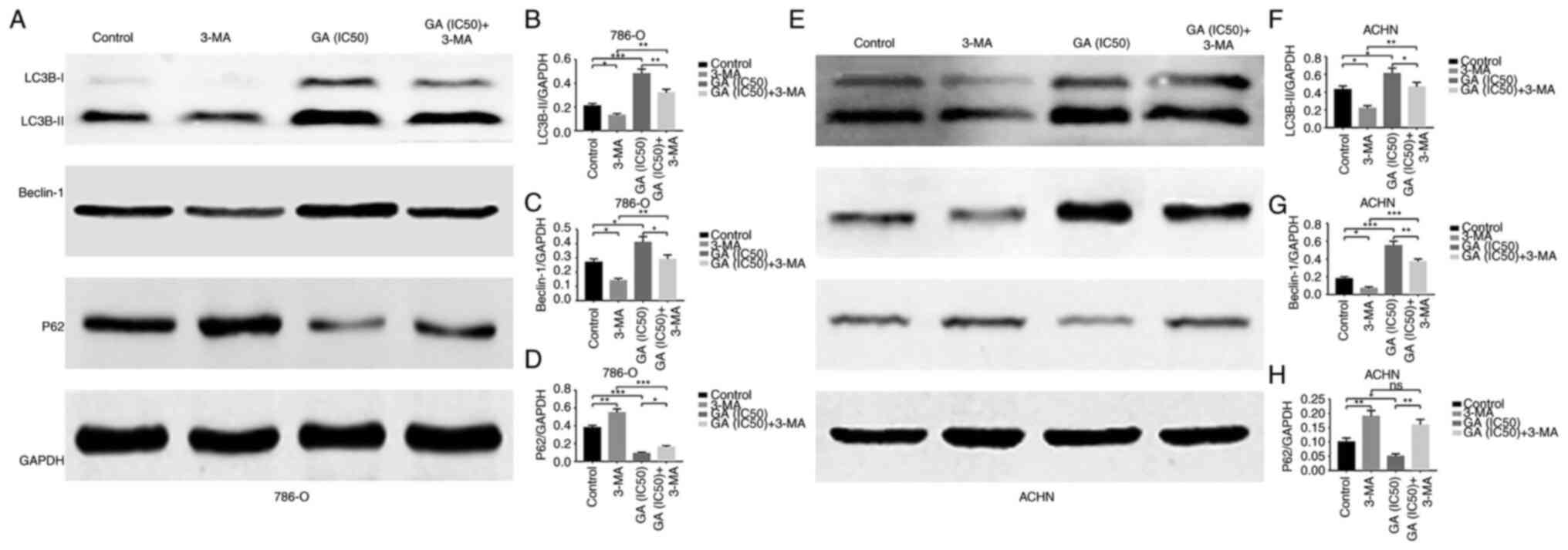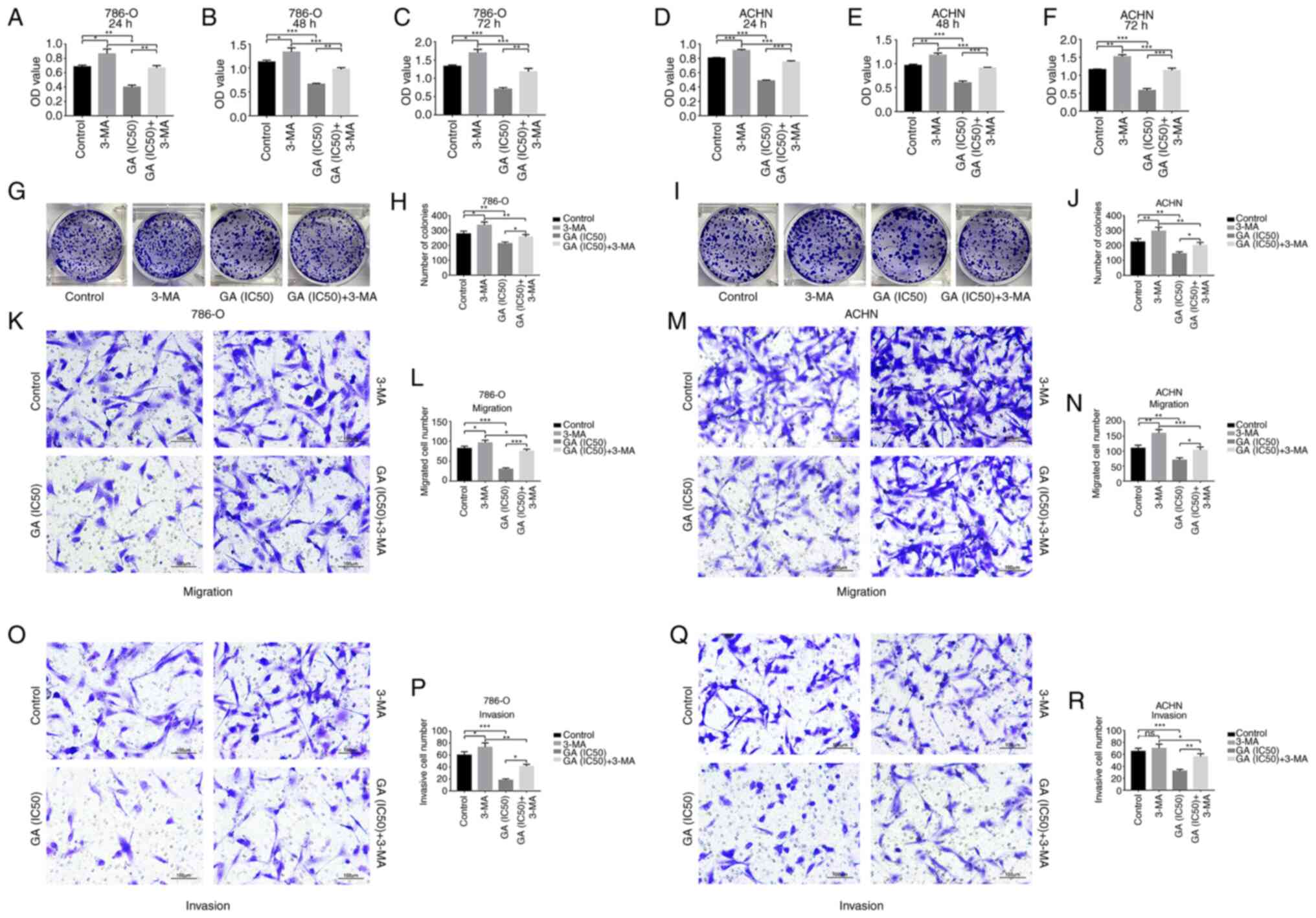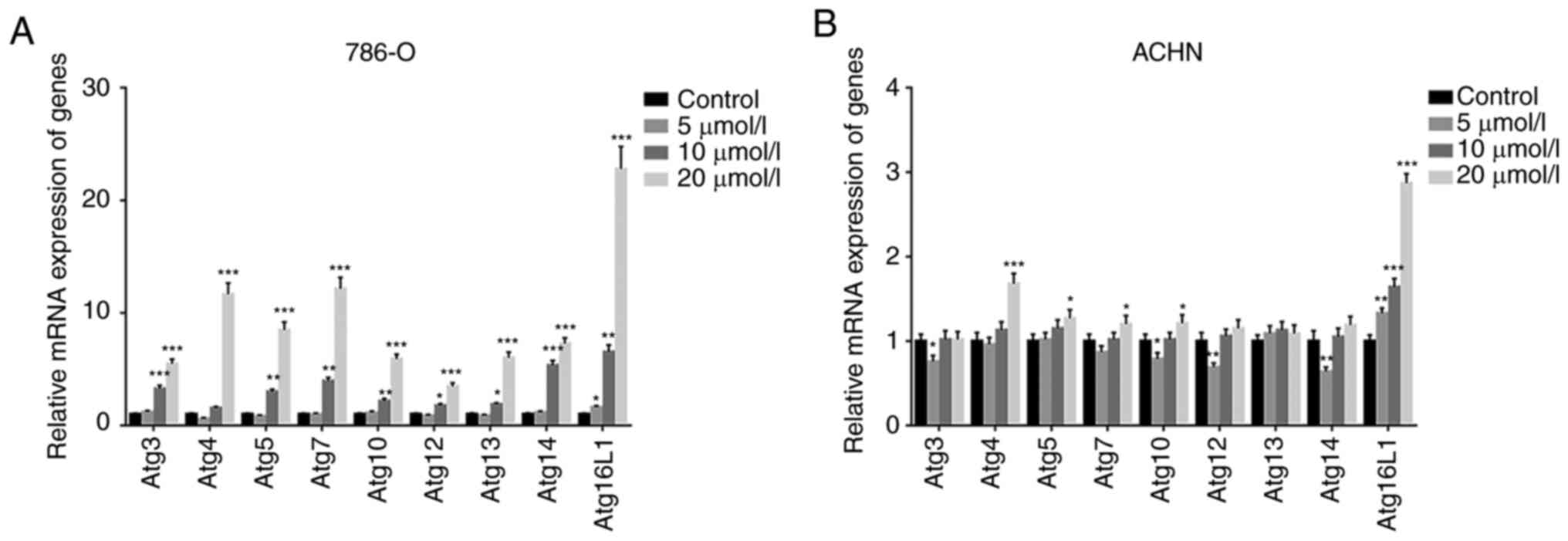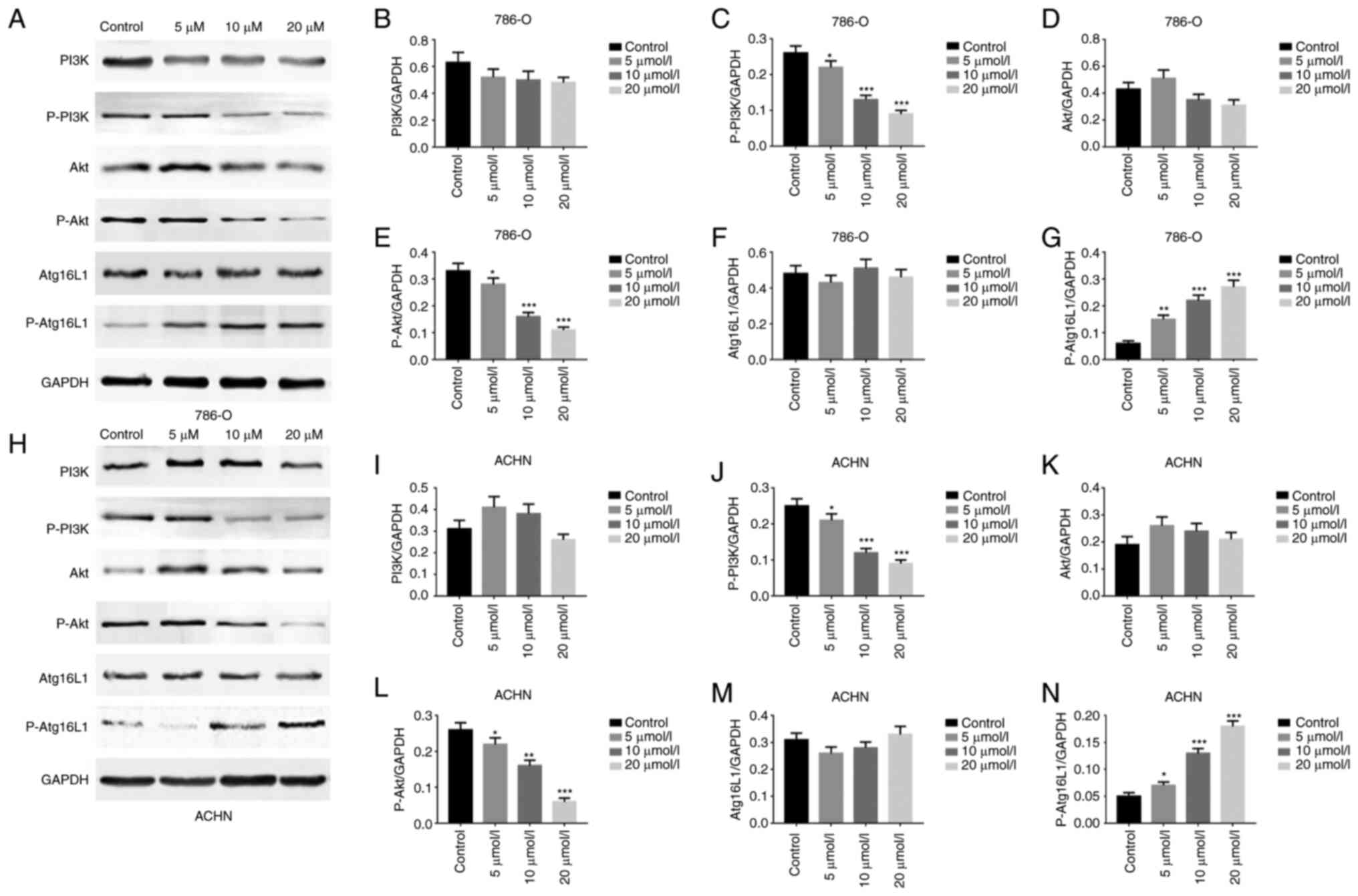|
1
|
Petejova N and Martinek A: Renal cell
carcinoma: Review of etiology, pathophysiology and risk factors.
Biomed Pap Med Fac Univ Palacky Olomouc Czech Repub. 160:183–194.
2016. View Article : Google Scholar
|
|
2
|
Qu Y, Feng J, Wu X, Bai L, Xu W, Zhu L,
Liu Y, Xu F, Zhang X, Yang G, et al: A proteogenomic analysis of
clear cell renal cell carcinoma in a Chinese population. Nat
Commun. 13:20522022. View Article : Google Scholar : PubMed/NCBI
|
|
3
|
Siegel RL, Miller KD and Jemal A: Cancer
statistics 2017. CA Cancer J Clin. 67:7–30. 2017. View Article : Google Scholar : PubMed/NCBI
|
|
4
|
Capitanio U, Bensalah K, Bex A, Boorjian
SA, Bray F, Coleman J, Gore JL, Sun M, Wood C and Russo P:
Epidemiology of renal cell carcinoma. Eur Urol. 75:74–84. 2019.
View Article : Google Scholar
|
|
5
|
Sun Z, Tao W, Guo X, Jing C, Zhang M, Wang
Z, Kong F, Suo N, Jiang S and Wang H: Construction of a
lactate-related prognostic signature for predicting prognosis,
tumor microenvironment, and immune response in kidney renal clear
cell carcinoma. Front Immunol. 13:8189842022. View Article : Google Scholar : PubMed/NCBI
|
|
6
|
Bi K, He MX, Bakouny Z, Kanodia A,
Napolitano S, Wu J, Grimaldi G, Braun DA, Cuoco MS, Mayorga A, et
al: Tumor and immune reprogramming during immunotherapy in advanced
renal cell carcinoma. Cancer Cell. 39:649–661.e5. 2021. View Article : Google Scholar : PubMed/NCBI
|
|
7
|
Wolf MM, Kimryn Rathmell W and Beckermann
KE: Modeling clear cell renal cell carcinoma and therapeutic
implications. Oncogene. 39:3413–3426. 2020. View Article : Google Scholar : PubMed/NCBI
|
|
8
|
Maiuolo J, Gliozzi M, Carresi C, Musolino
V, Oppedisano F, Scarano F, Nucera S, Scicchitano M, Bosco F, Macri
R, et al: Nutraceuticals and cancer: Potential for natural
polyphenols. Nutrients. 13:38342021. View Article : Google Scholar : PubMed/NCBI
|
|
9
|
Zhao B and Hu M: Gallic acid reduces cell
viability, proliferation, invasion and angiogenesis in human
cervical cancer cells. Oncol Lett. 6:1749–1755. 2013. View Article : Google Scholar
|
|
10
|
Tuli HS, Mistry H, Kaur G, Aggarwal D,
Garg VK, Mittal S, Yerer MB, Sak K and Khan MA: Gallic acid: A
dietary polyphenol that exhibits anti-neoplastic activities by
modulating multiple oncogenic targets. Anticancer Agents Med Chem.
22:499–514. 2022. View Article : Google Scholar
|
|
11
|
Al Zahrani NA, El-Shishtawy RM and Asiri
AM: Recent developments of gallic acid derivatives and their
hybrids in medicinal chemistry: A review. Eur J Med Chem.
204:1126092020. View Article : Google Scholar : PubMed/NCBI
|
|
12
|
Bai J, Zhang Y, Tang C, Hou Y, Ai X, Chen
X, Zhang Y, Wang X and Meng X: Gallic acid: Pharmacological
activities and molecular mechanisms involved in
inflammation-related diseases. Biomed Pharmacother. 133:1109852021.
View Article : Google Scholar
|
|
13
|
Ashrafizadeh M, Zarrabi A, Mirzaei S,
Hashemi F, Samarghandian S, Zabolian A, Hushmandi K, Ang HL, Sethi
G, Kumar AP, et al: Gallic acid for cancer therapy: Molecular
mechanisms and boosting efficacy by nanoscopical delivery. Food
Chem Toxicol. 157:1125762021. View Article : Google Scholar : PubMed/NCBI
|
|
14
|
Deng B, Yang B, Chen J, Wang S, Zhang W,
Guo Y, Han Y, Li H, Dang Y, Yuan Y, et al: Gallic acid induces
T-helper-1-like Treg cells and strengthens immune
checkpoint blockade efficacy. J Immunother Cancer. 10:e0040372022.
View Article : Google Scholar
|
|
15
|
Zhang HH, Zhang Y, Cheng YN, Gong FL, Cao
ZQ, Yu LG and Guo XL: Metformin incombination with curcumin
inhibits the growth, metastasis, and angiogenesis of hepatocellular
carcinoma in vitro and in vivo. Mol Carcinog. 57:44–56. 2018.
View Article : Google Scholar
|
|
16
|
Lin Y, Luo T, Weng A, Huang X, Yao Y, Fu
Z, Li Y, Liu A, Li X, Chen D and Pan H: Gallic acid alleviates
gouty arthritis by inhibiting NLRP3 inflammasome activation and
pyroptosis through enhancing Nrf2 signaling. Front Immunol.
11:5805932020. View Article : Google Scholar : PubMed/NCBI
|
|
17
|
Zhao W, Shi F, Guo Z, Zhao J, Song X and
Yang H: Metabolite of ellagitannins, urolithin A induces autophagy
and inhibits metastasis in human sw620 colorectal cancer cells. Mol
Carcinog. 57:193–200. 2018. View Article : Google Scholar :
|
|
18
|
Cao Y, Chen J, Ren G, Zhang Y, Tan X and
Yang L: Punicalagin prevents inflammation in LPS-induced RAW264.7
macrophages by inhibiting FoxO3a/autophagy signaling pathway.
Nutrients. 11:27942019. View Article : Google Scholar : PubMed/NCBI
|
|
19
|
Wang SG, Huang MH, Li JH, Lai FI, Lee HM
and Hsu YN: Punicalagin induces apoptotic and autophagic cell death
in human U87MG glioma cells. Acta Pharmacol Sin. 34:1411–1419.
2013. View Article : Google Scholar : PubMed/NCBI
|
|
20
|
Klionsky DJ, Petroni G, Amaravadi RK,
Baehrecke EH, Ballabio A, Boya P, Bravo-San Pedro JM, Cadwell K,
Cecconi F, Choi AMK, et al: Autophagy in major human diseases. EMBO
J. 40:e1088632021. View Article : Google Scholar : PubMed/NCBI
|
|
21
|
Ferro F, Servais S, Besson P, Roger S,
Dumas JF and Brisson L: Autophagy and mitophagy in cancer metabolic
remodelling. Semin Cell Dev Biol. 98:129–138. 2020. View Article : Google Scholar
|
|
22
|
Moon S and Jung HS: Endoplasmic reticulum
stress and dysregulated autophagy in human pancreatic beta cells.
Diabetes Metab J. 46:533–542. 2022. View Article : Google Scholar : PubMed/NCBI
|
|
23
|
Li X, He S and Ma B: Autophagy and
autophagy-related proteins in cancer. Mol Cancer. 19:122020.
View Article : Google Scholar : PubMed/NCBI
|
|
24
|
Zeng M, Su Y, Li K, Jin D, Li Q, Li Y and
Zhou B: Gallic acid inhibits bladder cancer T24 cell progression
through mitochondrial dysfunction and PI3K/Akt/NF-κB signaling
suppression. Front Pharmacol. 11:12222020. View Article : Google Scholar
|
|
25
|
Khadirnaikar S, Kumar P, Pandi SN, Malik
R, Dhanasekaran SM and Shukla SK: Immune associated LncRNAs
identify novel prognostic subtypes of renal clear cell carcinoma.
Mol Carcinog. 58:544–553. 2019. View Article : Google Scholar
|
|
26
|
Sales MS, Roy A, Antony L, Banu SK,
Jeyaraman S and Manikkam R: Octyl gallate and gallic acid isolated
from Terminalia bellarica regulates normal cell cycle in human
breast cancer cell lines. Biomed Pharmacother. 103:1577–1584. 2018.
View Article : Google Scholar : PubMed/NCBI
|
|
27
|
Gu R, Zhang M, Meng H, Xu D and Xie Y:
Gallic acid targets acute myeloid leukemia via Akt/mTOR-dependent
mitochondrial respiration inhibition. Biomed Pharmacother.
105:491–497. 2018. View Article : Google Scholar : PubMed/NCBI
|
|
28
|
Pham HNT, Sakoff JA, Vuong QV, Bowyer MC
and Scarlett CJ: Comparative cytotoxic activity between kaempferol
and gallic acid against various cancer cell lines. Data Brief.
21:1033–1036. 2018. View Article : Google Scholar : PubMed/NCBI
|
|
29
|
Rosman R, Saifullah B, Maniam S, Dorniani
D, Hussein MZ and Fakurazi S: Improved anticancer effect of
magnetite nanocomposite formulation of GALLIC Acid
(Fe3O4-PEG-GA) against lung, breast and colon
cancer cells. Nanomaterials (Basel). 8:832018. View Article : Google Scholar
|
|
30
|
Hong Z, Tang P, Liu B, Ran C, Yuan C,
Zhang Y, Lu Y, Duan X, Yang Y and Wu H: Ferroptosis-related genes
for overall survival prediction in patients with colorectal cancer
can be inhibited by gallic acid. Int J Biol Sci. 17:942–956. 2021.
View Article : Google Scholar : PubMed/NCBI
|
|
31
|
Cai L, Wei Z, Zhao X, Li Y, Li X and Jiang
X: Gallic acid mitigates LPS-induced inflammatory response via
suppressing NF-κB signalling pathway in IPEC-J2 cells. J Anim
Physiol Anim Nutr (Berl). 106:1000–1008. 2022. View Article : Google Scholar
|
|
32
|
Zhang P, Ye J, Dai J, Wang Y, Chen G, Hu
J, Hu Q and Fei J: Gallic acid inhibits osteoclastogenesis and
prevents ovariectomy-induced bone loss. Front Endocrinol
(Lausanne). 13:9632372022. View Article : Google Scholar
|
|
33
|
Lee HL, Lin CS, Kao SH and Chou MC: Gallic
acid induces G1 phase arrest and apoptosis of triple-negative
breast cancer cell MDA-MB-231 via p38 mitogen-activated protein
kinase/p21/p27 axis. Anticancer Drugs. 28:1150–1156. 2017.
View Article : Google Scholar : PubMed/NCBI
|
|
34
|
Lima KG, Krause GC, Schuster AD, Catarina
AV, Basso BS, De Mesquita FC, Pedrazza L, Marczak ES, Martha BA,
Nunes FB, et al: Gallic acid reduces cell growth by induction of
apoptosis and reduction of IL-8 in HepG2 cells. Biomed
Pharmacother. 84:1282–1290. 2016. View Article : Google Scholar : PubMed/NCBI
|
|
35
|
Ho HH, Chang CS, Ho WC, Liao SY, Lin WL
and Wang CJ: Gallic acid inhibits gastric cancer cells metastasis
and invasive growth via increased expression of RhoB,
downregulation of AKT/small GTPase signals and inhibition of NF-κB
activity. Toxicol Appl Pharmacol. 266:76–85. 2013. View Article : Google Scholar
|
|
36
|
Subramanian AP, Jaganathan SK, Mandal M,
Supriyanto E and Muhamad II: Gallic acid induced apoptotic events
in HCT-15 colon cancer cells. World J Gastroenterol. 22:3952–3961.
2016. View Article : Google Scholar : PubMed/NCBI
|
|
37
|
Boya P, Reggiori F and Codogno P: Emerging
regulation and functions of autophagy. Nat Cell Biol. 15:713–720.
2013. View Article : Google Scholar : PubMed/NCBI
|
|
38
|
Das S, Shukla N, Singh SS, Kushwaha S and
Shrivastava R: Mechanism of interaction between autophagy and
apoptosis in cancer. Apoptosis. 26:512–533. 2021. View Article : Google Scholar : PubMed/NCBI
|
|
39
|
Tedesco I, Russo M, Bilotto S, Spagnuolo
C, Scognamiglio A, Palumbo R, Nappo A, Iacomino G, Moio L and Russo
GL: Dealcoholated red wine induces autophagic and apoptotic cell
death in an osteosarcoma cell line. Food Chem Toxicol. 60:377–384.
2013. View Article : Google Scholar : PubMed/NCBI
|
|
40
|
Liu MP, Liao M, Dai C, Chen JF, Yang CJ,
Liu M, Chen ZG and Yao MC: Sanguisorba officinalis L
synergistically enhanced 5-fluorouracil cytotoxicity in colorectal
cancer cells by promoting a reactive oxygen species-mediated,
mitochondria-caspase-dependent apoptotic pathway. Sci Rep.
6:342452016. View Article : Google Scholar : PubMed/NCBI
|
|
41
|
Dong Y, Yin S, Jiang C, Luo X, Guo X, Zhao
C, Fan L, Meng Y, Lu J, Song X, et al: Involvement of autophagy
induction in penta-1, 2,3,4,6-O-galloyl-β-D-glucose-induced
senescence-like growth arrest in human cancer cells. Autophagy.
10:296–310. 2014. View Article : Google Scholar : PubMed/NCBI
|
|
42
|
Iershov A, Nemazanyy I, Alkhoury C, Girard
M, Barth E, Cagnard N, Montagner A, Chretien D, Rugarli EI, Guillou
H, et al: The class 3 PI3K coordinates autophagy and mitochondrial
lipid catabolism by controlling nuclear receptor PPARα. Nat Commun.
10:15662019. View Article : Google Scholar
|
|
43
|
Zhao F, Feng G, Zhu J, Su Z, Guo R, Liu J,
Zhang H and Zhai Y: 3-Methyladenine-enhanced susceptibility to
sorafenib in hepatocellular carcinoma cells by inhibiting
autophagy. Anticancer Drugs. 32:386–393. 2021. View Article : Google Scholar : PubMed/NCBI
|
|
44
|
Seglen PO and Gordon PB: 3-Methyladenine:
Specific inhibitor of autophagic/lysosomal protein degradation in
isolated rat hepatocytes. Proc Natl Acad Sci USA. 79:1889–1892.
1982. View Article : Google Scholar : PubMed/NCBI
|
|
45
|
Vinod V, Padmakrishnan CJ, Vijayan B and
Gopala S: 'How can I halt thee?' The puzzles involved in autophagic
inhibition. Pharmacol Res. 82:1–8. 2014. View Article : Google Scholar : PubMed/NCBI
|
|
46
|
Li J, Hou N, Faried A, Tsutsumi S,
Takeuchi T and Kuwano H: Inhibition of autophagy by 3-MA enhances
the effect of 5-FU-induced apoptosis in colon cancer cells. Ann
Surg Oncol. 16:761–771. 2009. View Article : Google Scholar : PubMed/NCBI
|
|
47
|
Li J, Yang D, Wang W, Piao S, Zhou J,
Saiyin W, Zheng C, Sun H and Li Y: Inhibition of autophagy by 3-MA
enhances IL-24-induced apoptosis in human oral squamous cell
carcinoma cells. J Exp Clin Cancer Res. 34:972015. View Article : Google Scholar : PubMed/NCBI
|
|
48
|
Guo H, German P, Bai S, Barnes S, Guo W,
Qi X, Lou H, Liang J, Jonasch E, Mills GB and Ding Z: The PI3K/AKT
pathway and renal cell carcinoma. J Genet Genomics. 42:343–353.
2015. View Article : Google Scholar : PubMed/NCBI
|
|
49
|
Rajabi S, Maresca M, Yumashev AV, Choopani
R and Hajimehdipoor H: The most competent plant-derived natural
products for targeting apoptosis in cancer therapy. Biomolecules.
11:5342021. View Article : Google Scholar : PubMed/NCBI
|
|
50
|
Chimento A, De Luca A, D'Amico M, De
Amicis F and Pezzi V: The involvement of natural polyphenols in
molecular mechanisms inducing apoptosis in tumor cells: A promising
adjuvant in cancer therapy. Int J Mol Sci. 24:16802023. View Article : Google Scholar : PubMed/NCBI
|















